新概念第三册Lesson 37 The Westhaven Express讲义
文档属性
| 名称 | 新概念第三册Lesson 37 The Westhaven Express讲义 | 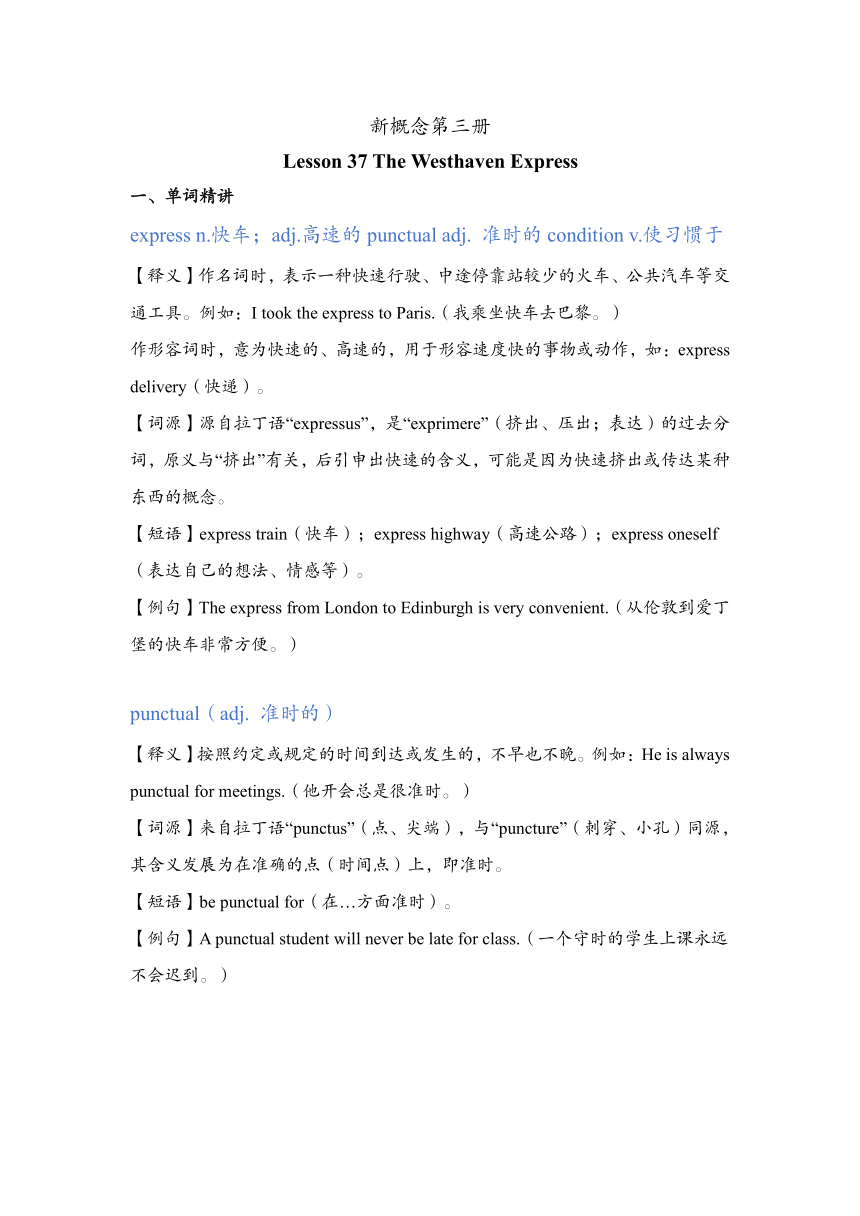 | |
| 格式 | docx | ||
| 文件大小 | 409.0KB | ||
| 资源类型 | 教案 | ||
| 版本资源 | 新概念英语 | ||
| 科目 | 英语 | ||
| 更新时间 | 2024-12-05 09:47:53 | ||
图片预览

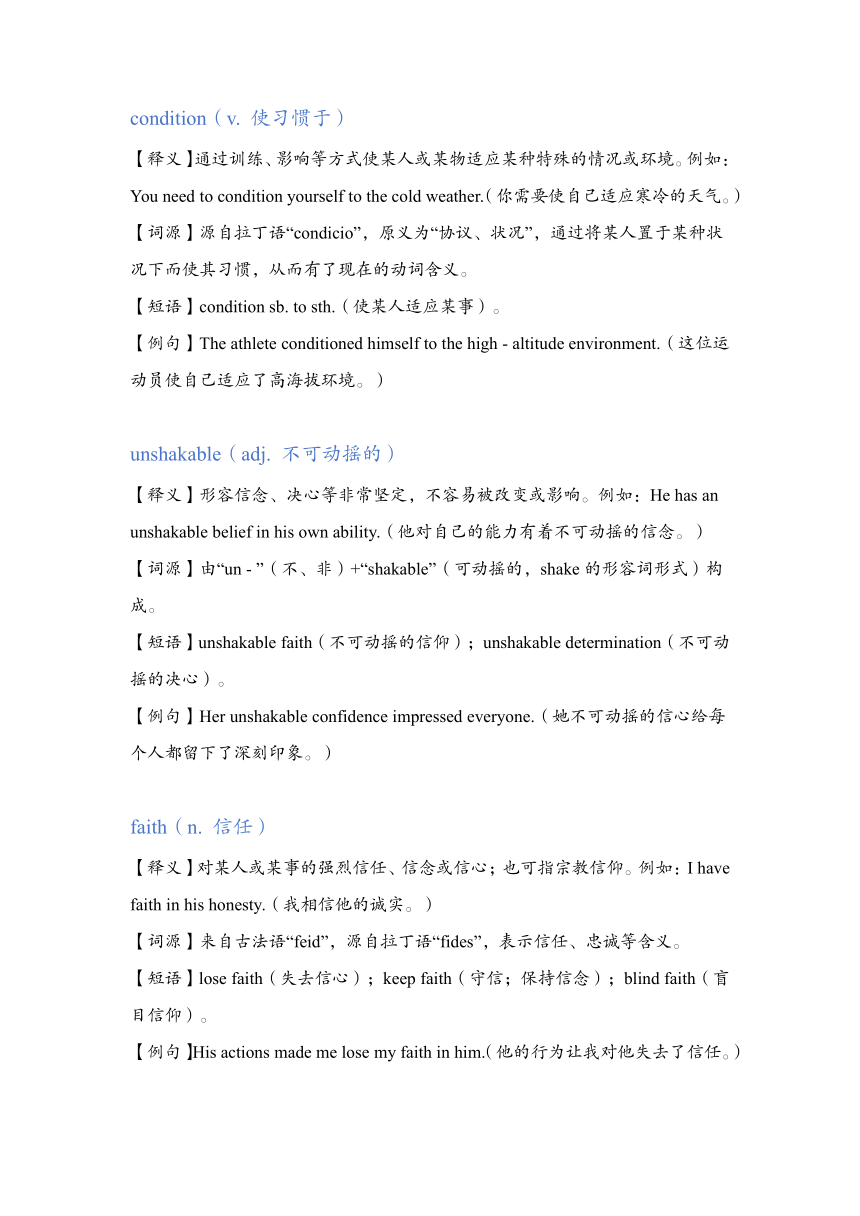
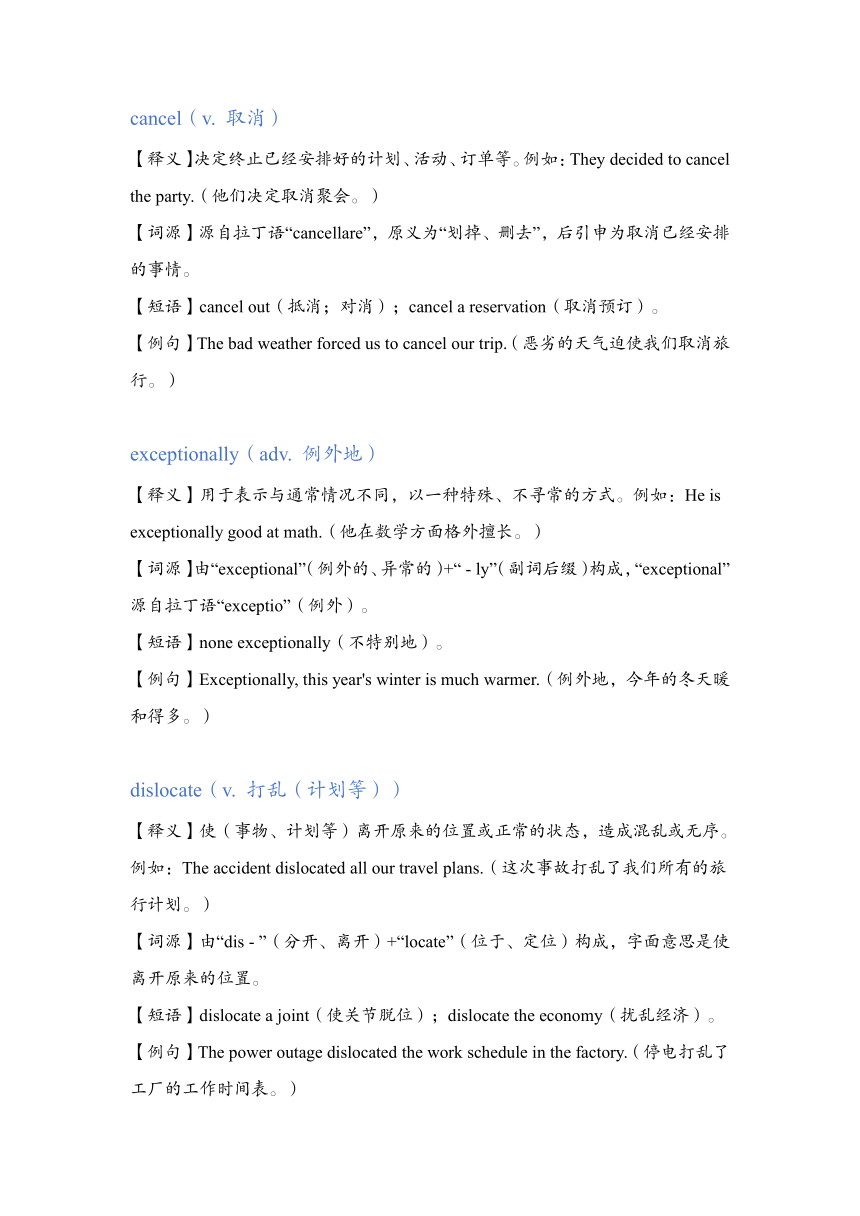
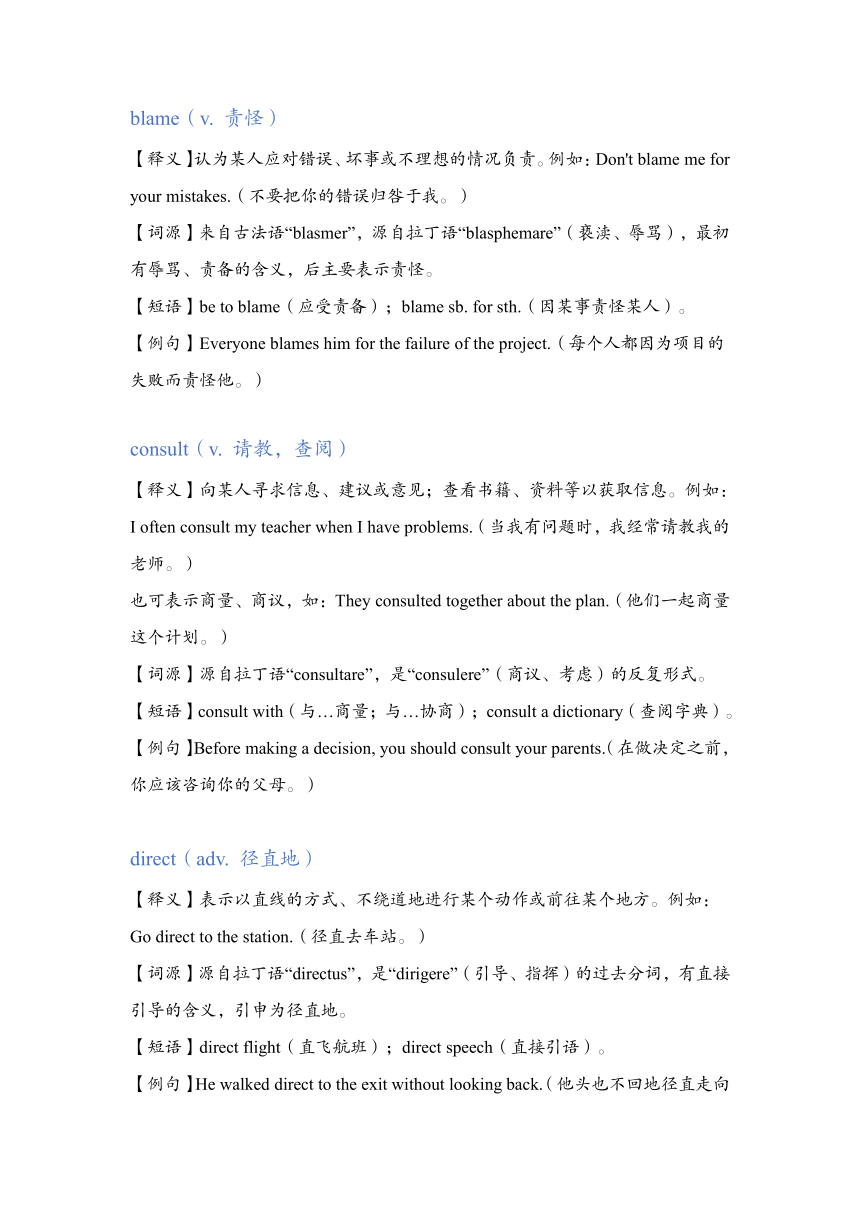
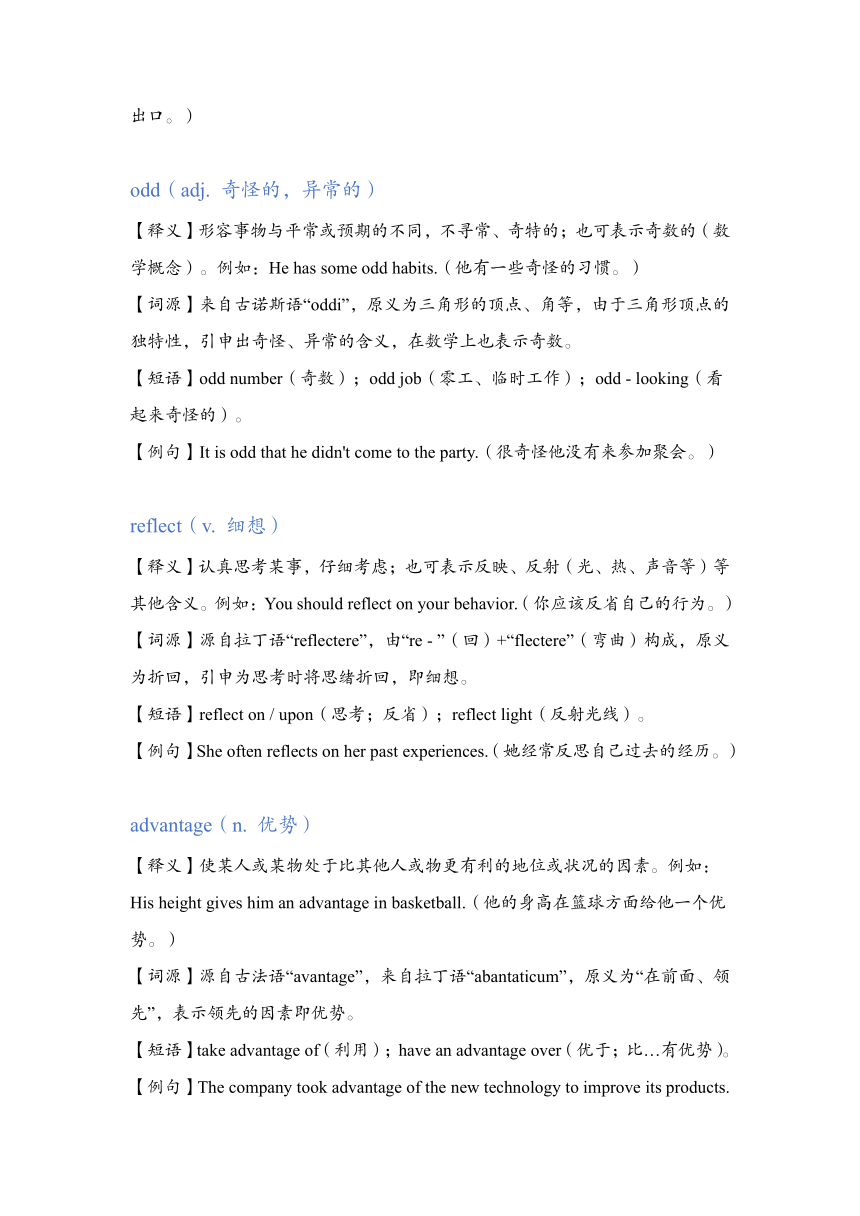
文档简介
新概念第三册
Lesson 37 The Westhaven Express
单词精讲
express n.快车;adj.高速的 punctual adj. 准时的 condition v.使习惯于
【释义】作名词时,表示一种快速行驶、中途停靠站较少的火车、公共汽车等交通工具。例如:I took the express to Paris.(我乘坐快车去巴黎。)
作形容词时,意为快速的、高速的,用于形容速度快的事物或动作,如:express delivery(快递)。
【词源】源自拉丁语“expressus”,是“exprimere”(挤出、压出;表达)的过去分词,原义与“挤出”有关,后引申出快速的含义,可能是因为快速挤出或传达某种东西的概念。
【短语】express train(快车);express highway(高速公路);express oneself(表达自己的想法、情感等)。
【例句】The express from London to Edinburgh is very convenient.(从伦敦到爱丁堡的快车非常方便。)
punctual(adj. 准时的)
【释义】按照约定或规定的时间到达或发生的,不早也不晚。例如:He is always punctual for meetings.(他开会总是很准时。)
【词源】来自拉丁语“punctus”(点、尖端),与“puncture”(刺穿、小孔)同源,其含义发展为在准确的点(时间点)上,即准时。
【短语】be punctual for(在…方面准时)。
【例句】A punctual student will never be late for class.(一个守时的学生上课永远不会迟到。)
condition(v. 使习惯于)
【释义】通过训练、影响等方式使某人或某物适应某种特殊的情况或环境。例如:You need to condition yourself to the cold weather.(你需要使自己适应寒冷的天气。)
【词源】源自拉丁语“condicio”,原义为“协议、状况”,通过将某人置于某种状况下而使其习惯,从而有了现在的动词含义。
【短语】condition sb. to sth.(使某人适应某事)。
【例句】The athlete conditioned himself to the high - altitude environment.(这位运动员使自己适应了高海拔环境。)
unshakable(adj. 不可动摇的)
【释义】形容信念、决心等非常坚定,不容易被改变或影响。例如:He has an unshakable belief in his own ability.(他对自己的能力有着不可动摇的信念。)
【词源】由“un - ”(不、非)+“shakable”(可动摇的,shake的形容词形式)构成。
【短语】unshakable faith(不可动摇的信仰);unshakable determination(不可动摇的决心)。
【例句】Her unshakable confidence impressed everyone.(她不可动摇的信心给每个人都留下了深刻印象。)
faith(n. 信任)
【释义】对某人或某事的强烈信任、信念或信心;也可指宗教信仰。例如:I have faith in his honesty.(我相信他的诚实。)
【词源】来自古法语“feid”,源自拉丁语“fides”,表示信任、忠诚等含义。
【短语】lose faith(失去信心);keep faith(守信;保持信念);blind faith(盲目信仰)。
【例句】His actions made me lose my faith in him.(他的行为让我对他失去了信任。)
cancel(v. 取消)
【释义】决定终止已经安排好的计划、活动、订单等。例如:They decided to cancel the party.(他们决定取消聚会。)
【词源】源自拉丁语“cancellare”,原义为“划掉、删去”,后引申为取消已经安排的事情。
【短语】cancel out(抵消;对消);cancel a reservation(取消预订)。
【例句】The bad weather forced us to cancel our trip.(恶劣的天气迫使我们取消旅行。)
exceptionally(adv. 例外地)
【释义】用于表示与通常情况不同,以一种特殊、不寻常的方式。例如:He is exceptionally good at math.(他在数学方面格外擅长。)
【词源】由“exceptional”(例外的、异常的)+“ - ly”(副词后缀)构成,“exceptional”源自拉丁语“exceptio”(例外)。
【短语】none exceptionally(不特别地)。
【例句】Exceptionally, this year's winter is much warmer.(例外地,今年的冬天暖和得多。)
dislocate(v. 打乱(计划等))
【释义】使(事物、计划等)离开原来的位置或正常的状态,造成混乱或无序。例如:The accident dislocated all our travel plans.(这次事故打乱了我们所有的旅行计划。)
【词源】由“dis - ”(分开、离开)+“locate”(位于、定位)构成,字面意思是使离开原来的位置。
【短语】dislocate a joint(使关节脱位);dislocate the economy(扰乱经济)。
【例句】The power outage dislocated the work schedule in the factory.(停电打乱了工厂的工作时间表。)
blame(v. 责怪)
【释义】认为某人应对错误、坏事或不理想的情况负责。例如:Don't blame me for your mistakes.(不要把你的错误归咎于我。)
【词源】来自古法语“blasmer”,源自拉丁语“blasphemare”(亵渎、辱骂),最初有辱骂、责备的含义,后主要表示责怪。
【短语】be to blame(应受责备);blame sb. for sth.(因某事责怪某人)。
【例句】Everyone blames him for the failure of the project.(每个人都因为项目的失败而责怪他。)
consult(v. 请教,查阅)
【释义】向某人寻求信息、建议或意见;查看书籍、资料等以获取信息。例如:I often consult my teacher when I have problems.(当我有问题时,我经常请教我的老师。)
也可表示商量、商议,如:They consulted together about the plan.(他们一起商量这个计划。)
【词源】源自拉丁语“consultare”,是“consulere”(商议、考虑)的反复形式。
【短语】consult with(与…商量;与…协商);consult a dictionary(查阅字典)。
【例句】Before making a decision, you should consult your parents.(在做决定之前,你应该咨询你的父母。)
direct(adv. 径直地)
【释义】表示以直线的方式、不绕道地进行某个动作或前往某个地方。例如:Go direct to the station.(径直去车站。)
【词源】源自拉丁语“directus”,是“dirigere”(引导、指挥)的过去分词,有直接引导的含义,引申为径直地。
【短语】direct flight(直飞航班);direct speech(直接引语)。
【例句】He walked direct to the exit without looking back.(他头也不回地径直走向出口。)
odd(adj. 奇怪的,异常的)
【释义】形容事物与平常或预期的不同,不寻常、奇特的;也可表示奇数的(数学概念)。例如:He has some odd habits.(他有一些奇怪的习惯。)
【词源】来自古诺斯语“oddi”,原义为三角形的顶点、角等,由于三角形顶点的独特性,引申出奇怪、异常的含义,在数学上也表示奇数。
【短语】odd number(奇数);odd job(零工、临时工作);odd - looking(看起来奇怪的)。
【例句】It is odd that he didn't come to the party.(很奇怪他没有来参加聚会。)
reflect(v. 细想)
【释义】认真思考某事,仔细考虑;也可表示反映、反射(光、热、声音等)等其他含义。例如:You should reflect on your behavior.(你应该反省自己的行为。)
【词源】源自拉丁语“reflectere”,由“re - ”(回)+“flectere”(弯曲)构成,原义为折回,引申为思考时将思绪折回,即细想。
【短语】reflect on / upon(思考;反省);reflect light(反射光线)。
【例句】She often reflects on her past experiences.(她经常反思自己过去的经历。)
advantage(n. 优势)
【释义】使某人或某物处于比其他人或物更有利的地位或状况的因素。例如:His height gives him an advantage in basketball.(他的身高在篮球方面给他一个优势。)
【词源】源自古法语“avantage”,来自拉丁语“abantaticum”,原义为“在前面、领先”,表示领先的因素即优势。
【短语】take advantage of(利用);have an advantage over(优于;比…有优势)。
【例句】The company took advantage of the new technology to improve its products.(这家公司利用新技术来改进其产品。)
mighty(adj. 强大的,有力的)
【释义】形容力量非常大的,有威力的。例如:A mighty wind blew the roof off the house.(一阵强风把房子的屋顶吹掉了。)
【词源】源自古英语“mihtig”,“miht”(力量)+“ - ig”(形容词后缀),表示充满力量的。
【短语】high and mighty(趾高气扬的;神气活现的);mighty force(强大的力量)。
【例句】The mighty army marched forward.(强大的军队向前行进。)
dawdle(v. 慢吞吞地动或做)
【释义】行动缓慢、拖延时间,以一种懒散的方式做某事。例如:Don't dawdle on your way to school.(不要在上学路上磨磨蹭蹭的。)
【词源】可能是一个拟声词,模拟缓慢、拖沓的动作发出的声音。
【短语】dawdle away(虚度;混日子)。
【例句】He dawdled over his homework and didn't finish it on time.(他磨磨蹭蹭地做家庭作业,没有按时完成。)
chug(v. 咔嚓咔嚓地响)
【释义】发出像火车或旧发动机那样的有节奏的、低沉的、重复的声音。例如:The old train chugged along the tracks.(旧火车沿着铁轨咔嚓咔嚓地行驶。)
【词源】拟声词,模仿这种特殊声音而产生的单词。
【短语】chug along(缓慢前行;咔嚓咔嚓地前进)。
【例句】The boat chugged across the lake.(船咔嚓咔嚓地穿过湖泊。)
lodge(v. 提出)
【释义】正式提出(请求、投诉、主张等)。例如:He lodged a complaint with the manager.(他向经理提出投诉。)
【词源】源自古法语“logier”,最初表示提供住宿,后引申出提出(把某事安置在某个地方,如把投诉安置在管理者那里,即提出投诉)的含义。
【短语】lodge a claim(提出索赔要求);lodge an appeal(提出上诉)。
【例句】They lodged a protest against the new policy.(他们对新政策提出抗议。)
complaint(n. 抱怨)
【释义】表达对某事不满的话语或情绪;也可指疾病等(较正式用法)。例如:I have a lot of complaints about the service here.(我对这里的服务有很多抱怨。)
【词源】源自拉丁语“complangere”,由“com - ”(一起)+“plangere”(捶胸、悲叹)构成,原义为一起悲叹,后表示抱怨。
【短语】make a complaint(提出抱怨);lodge a complaint(投诉)。
【例句】Her constant complaints made everyone uncomfortable.(她不断的抱怨让每个人都不舒服。)
triumph(n. 胜利)
【释义】巨大的成功、胜利,尤指经过艰难困苦或竞争后取得的成功。例如:The team celebrated their triumph in the championship.(这个队庆祝他们在锦标赛中的胜利。)
【词源】源自拉丁语“triumphus”,原指古罗马庆祝胜利的凯旋仪式,后表示胜利本身。
【短语】in triumph(胜利地;洋洋得意地);triumph over(战胜;击败)。
【例句】He achieved a great triumph in his career.(他在职业生涯中取得了巨大的胜利。)
asterisk(n. 星号(*))
【释义】一种书写或印刷符号(*),常用于表示注释、特殊强调等。例如:There is an asterisk next to the important item.(重要项目旁边有一个星号。)
【词源】源自希腊语“asteriskos”,“aster”(星)+“ - iskos”(小的后缀),表示小星星,即星号。
【短语】asterisked note(带星号的注释)。
【例句】Please pay attention to the asterisked items in the list.(请注意清单中带星号的项目。)
conduct(v. 引向,引导)
【释义】带领、引导某人或某物到某个地方;也可表示指挥(音乐、交通等)、表现等含义。例如:The waitress conducted us to our table.(女服务员把我们领到我们的桌子旁。)
【词源】源自拉丁语“conductus”,是“conducere”(引导、带来)的过去分词。
【短语】conduct oneself(表现;为人);conduct an experiment(进行实验)。
【例句】The guide conducted the tourists around the city.(导游带领游客在城市里游览。)
二、课文精讲
1.We have learnt to expect that trains will be punctual.我们已经习惯于相信火车总是准点的。
that引导宾语从句,说明expect的内容。
2.After years of conditioning, most of us have developed an unshakable faith in railway timetables.经过多年的适应,大多数人对火车时刻表产生了一种不可动摇的信念。
after years of conditioning放在句首,强调时间之长。
develop an unshakable faith in的意思是“对…形成了不可动摇的信念”。
condition表示“使习惯于”,我们常使用短语be conditioned to(习惯…)
3.It is all too easy to blame the railway authorities when something does go wrong.因此,一旦铁路上真出了问题,人们便不加思索地责备铁路当局。
it是形式主语,真正的主语是to blame the railway authorities。
4.The truth is that when mistakes occur, they are more likely to be ours than theirs. 事实上,差错很可能是我们自己,而不是铁路当局的。
that引导表语从句,交代truth是什么。
be likely to do sth.的意思是“很可能做某事”。
they 指mistakes; ours, theirs此处用斜体字表示强调,应该重读。
5.After consulting my railway timetable, I noted with satisfaction that there was an express train to Westhaven.我查看了列车时刻表,满意地了解到有一趟去威斯特海温的快车。
这又是一个“after+现在分词短语”结构的省略式的时间状语从句。That引导宾语从句,交代noted的内容。
6.It went direct from my local station and the journey lasted a mere hour and seventeen minutes.这是趟直达车,旅途总共才需1小时17分钟。
it指代上一句中的express train。
last本意是“持续”,在此引申为“乘火车旅行所需的时间是…”
7.When I boarded the train, I could not help noticing that a great many local people got on as well.上车后,我不禁注意到许多当地人也上了车。
when引导时间状语从句,交代上车后发生的事情。That引导宾语从句,说明noticing的内容。
board the train的意思是“登山火车”。
cannot help doing sth.的意思是“情不自禁的做某事”。
At the time, this did not strike me as odd.一开始,我并不感到奇怪。
at the time在此处相当于at the beginning。
strike sb.as的意思是“给某人以…印象”。
9. I reflected that there must be a great many people besides myself who wished to take advantage of this excellent service.我想除我之外,想利用快车之便的也一定大有人在。
that引导宾语从句,交代reflected的内容。Who引导定语从句,修饰people。
10.Neither was I surprised when the train stopped at Widley, a tiny station a few miles along the line.
火车开出几英里即在一个小站威德里停了下来。对此,我不觉得奇怪。
neither放在句首,句子要部分倒装,故neither后面写作was I surprised。
a tiny station a few miles along the line是Widley的同位语,起解释说明的作用。
11.Even a mighty express train can be held up by signals.因为即便是特别快车也可能被信号拦住。
can be held up by signals是典型的被动语态的用法。
But when the train dawdled at station after station, I began to wonder.
但是,当火车一站接着一站往前蠕动时,我便产生了怀疑。
dawdle一词在此的用法是夸张修辞格。
station after station的意思是“一站又一站”。
But when the train dawdled at station after station, I began to wonder. It suddenly dawned on me that this express was not roaring down the line at ninety miles an hour, but barely chugging along at thirty.
我突然感到这趟快车并没以时速90英里的速度呼啸前进,而是卟哧卟哧地向前爬行,时速仅30英里。
it指代火车开得慢的事实。Not…but…的意思是“不是…而是…”。
14.One hour and seventeen minutes passed and we had not even covered half the distance.1小时17分过去了,走了还不到一半路程。
passed and…(时间过去多久之后发生了…)是个强调时间的用法。
15.I asked a passenger if this was the Westhaven Express, but he had not even heard of it.我问一位乘客,这是不是开往威斯特海温的那趟快车,他说从未听说过有这么一趟快车。
if引导宾语从句,交代asked的内容。
16.I determined to lodge a complaint as soon as we arrived.我决定到目的地就给铁路部门提意见。
as soon as引导时间状语从句。
lodge a complaint的意思是“提意见,投诉”。
17. Two hours later, I was talking angrily to the station master at Westhaven.两小时后,我气呼呼地同威斯特海温站站长说起此事。
talk to sb.的意思是“和某人谈论”。
18. When he denied the train's existence, I borrowed his copy of the timetable.他说根本没有这趟车。于是我借他本人的列车时刻表。
when引导时间状语从句,交代前后两个动作的顺序。
copy的意思是“副本,复印件”。
19. There was a note of triumph in my voice when I told him that it was there in black and white.我带着一种胜利者的调子告诉他那趟车白纸黑字。明明白白印在时刻表上。
that引导的宾语从句说明told的内容,是直接宾语,him是间接宾语。
black and white的意思是“白纸黑字”,形容十分清楚。
Glancing at it briefly, he told me to look again.
他迅速地扫视了一眼,让我再看一遍。
glancing at it briefly为现在分词短语,作时间状语。
21 A tiny asterisk conducted me to a footnote at the bottom of the page.一个小小的星形符号把我的目光引到了那页底部一个说明上。
conduct sb.to的意思是“指引某人(做某事)”。
22. It said:This service has been suspended.上面写着:“此趟列车暂停运行。”
it said不可译为“它说”,而是“上面写道”。
Lesson 37 The Westhaven Express
单词精讲
express n.快车;adj.高速的 punctual adj. 准时的 condition v.使习惯于
【释义】作名词时,表示一种快速行驶、中途停靠站较少的火车、公共汽车等交通工具。例如:I took the express to Paris.(我乘坐快车去巴黎。)
作形容词时,意为快速的、高速的,用于形容速度快的事物或动作,如:express delivery(快递)。
【词源】源自拉丁语“expressus”,是“exprimere”(挤出、压出;表达)的过去分词,原义与“挤出”有关,后引申出快速的含义,可能是因为快速挤出或传达某种东西的概念。
【短语】express train(快车);express highway(高速公路);express oneself(表达自己的想法、情感等)。
【例句】The express from London to Edinburgh is very convenient.(从伦敦到爱丁堡的快车非常方便。)
punctual(adj. 准时的)
【释义】按照约定或规定的时间到达或发生的,不早也不晚。例如:He is always punctual for meetings.(他开会总是很准时。)
【词源】来自拉丁语“punctus”(点、尖端),与“puncture”(刺穿、小孔)同源,其含义发展为在准确的点(时间点)上,即准时。
【短语】be punctual for(在…方面准时)。
【例句】A punctual student will never be late for class.(一个守时的学生上课永远不会迟到。)
condition(v. 使习惯于)
【释义】通过训练、影响等方式使某人或某物适应某种特殊的情况或环境。例如:You need to condition yourself to the cold weather.(你需要使自己适应寒冷的天气。)
【词源】源自拉丁语“condicio”,原义为“协议、状况”,通过将某人置于某种状况下而使其习惯,从而有了现在的动词含义。
【短语】condition sb. to sth.(使某人适应某事)。
【例句】The athlete conditioned himself to the high - altitude environment.(这位运动员使自己适应了高海拔环境。)
unshakable(adj. 不可动摇的)
【释义】形容信念、决心等非常坚定,不容易被改变或影响。例如:He has an unshakable belief in his own ability.(他对自己的能力有着不可动摇的信念。)
【词源】由“un - ”(不、非)+“shakable”(可动摇的,shake的形容词形式)构成。
【短语】unshakable faith(不可动摇的信仰);unshakable determination(不可动摇的决心)。
【例句】Her unshakable confidence impressed everyone.(她不可动摇的信心给每个人都留下了深刻印象。)
faith(n. 信任)
【释义】对某人或某事的强烈信任、信念或信心;也可指宗教信仰。例如:I have faith in his honesty.(我相信他的诚实。)
【词源】来自古法语“feid”,源自拉丁语“fides”,表示信任、忠诚等含义。
【短语】lose faith(失去信心);keep faith(守信;保持信念);blind faith(盲目信仰)。
【例句】His actions made me lose my faith in him.(他的行为让我对他失去了信任。)
cancel(v. 取消)
【释义】决定终止已经安排好的计划、活动、订单等。例如:They decided to cancel the party.(他们决定取消聚会。)
【词源】源自拉丁语“cancellare”,原义为“划掉、删去”,后引申为取消已经安排的事情。
【短语】cancel out(抵消;对消);cancel a reservation(取消预订)。
【例句】The bad weather forced us to cancel our trip.(恶劣的天气迫使我们取消旅行。)
exceptionally(adv. 例外地)
【释义】用于表示与通常情况不同,以一种特殊、不寻常的方式。例如:He is exceptionally good at math.(他在数学方面格外擅长。)
【词源】由“exceptional”(例外的、异常的)+“ - ly”(副词后缀)构成,“exceptional”源自拉丁语“exceptio”(例外)。
【短语】none exceptionally(不特别地)。
【例句】Exceptionally, this year's winter is much warmer.(例外地,今年的冬天暖和得多。)
dislocate(v. 打乱(计划等))
【释义】使(事物、计划等)离开原来的位置或正常的状态,造成混乱或无序。例如:The accident dislocated all our travel plans.(这次事故打乱了我们所有的旅行计划。)
【词源】由“dis - ”(分开、离开)+“locate”(位于、定位)构成,字面意思是使离开原来的位置。
【短语】dislocate a joint(使关节脱位);dislocate the economy(扰乱经济)。
【例句】The power outage dislocated the work schedule in the factory.(停电打乱了工厂的工作时间表。)
blame(v. 责怪)
【释义】认为某人应对错误、坏事或不理想的情况负责。例如:Don't blame me for your mistakes.(不要把你的错误归咎于我。)
【词源】来自古法语“blasmer”,源自拉丁语“blasphemare”(亵渎、辱骂),最初有辱骂、责备的含义,后主要表示责怪。
【短语】be to blame(应受责备);blame sb. for sth.(因某事责怪某人)。
【例句】Everyone blames him for the failure of the project.(每个人都因为项目的失败而责怪他。)
consult(v. 请教,查阅)
【释义】向某人寻求信息、建议或意见;查看书籍、资料等以获取信息。例如:I often consult my teacher when I have problems.(当我有问题时,我经常请教我的老师。)
也可表示商量、商议,如:They consulted together about the plan.(他们一起商量这个计划。)
【词源】源自拉丁语“consultare”,是“consulere”(商议、考虑)的反复形式。
【短语】consult with(与…商量;与…协商);consult a dictionary(查阅字典)。
【例句】Before making a decision, you should consult your parents.(在做决定之前,你应该咨询你的父母。)
direct(adv. 径直地)
【释义】表示以直线的方式、不绕道地进行某个动作或前往某个地方。例如:Go direct to the station.(径直去车站。)
【词源】源自拉丁语“directus”,是“dirigere”(引导、指挥)的过去分词,有直接引导的含义,引申为径直地。
【短语】direct flight(直飞航班);direct speech(直接引语)。
【例句】He walked direct to the exit without looking back.(他头也不回地径直走向出口。)
odd(adj. 奇怪的,异常的)
【释义】形容事物与平常或预期的不同,不寻常、奇特的;也可表示奇数的(数学概念)。例如:He has some odd habits.(他有一些奇怪的习惯。)
【词源】来自古诺斯语“oddi”,原义为三角形的顶点、角等,由于三角形顶点的独特性,引申出奇怪、异常的含义,在数学上也表示奇数。
【短语】odd number(奇数);odd job(零工、临时工作);odd - looking(看起来奇怪的)。
【例句】It is odd that he didn't come to the party.(很奇怪他没有来参加聚会。)
reflect(v. 细想)
【释义】认真思考某事,仔细考虑;也可表示反映、反射(光、热、声音等)等其他含义。例如:You should reflect on your behavior.(你应该反省自己的行为。)
【词源】源自拉丁语“reflectere”,由“re - ”(回)+“flectere”(弯曲)构成,原义为折回,引申为思考时将思绪折回,即细想。
【短语】reflect on / upon(思考;反省);reflect light(反射光线)。
【例句】She often reflects on her past experiences.(她经常反思自己过去的经历。)
advantage(n. 优势)
【释义】使某人或某物处于比其他人或物更有利的地位或状况的因素。例如:His height gives him an advantage in basketball.(他的身高在篮球方面给他一个优势。)
【词源】源自古法语“avantage”,来自拉丁语“abantaticum”,原义为“在前面、领先”,表示领先的因素即优势。
【短语】take advantage of(利用);have an advantage over(优于;比…有优势)。
【例句】The company took advantage of the new technology to improve its products.(这家公司利用新技术来改进其产品。)
mighty(adj. 强大的,有力的)
【释义】形容力量非常大的,有威力的。例如:A mighty wind blew the roof off the house.(一阵强风把房子的屋顶吹掉了。)
【词源】源自古英语“mihtig”,“miht”(力量)+“ - ig”(形容词后缀),表示充满力量的。
【短语】high and mighty(趾高气扬的;神气活现的);mighty force(强大的力量)。
【例句】The mighty army marched forward.(强大的军队向前行进。)
dawdle(v. 慢吞吞地动或做)
【释义】行动缓慢、拖延时间,以一种懒散的方式做某事。例如:Don't dawdle on your way to school.(不要在上学路上磨磨蹭蹭的。)
【词源】可能是一个拟声词,模拟缓慢、拖沓的动作发出的声音。
【短语】dawdle away(虚度;混日子)。
【例句】He dawdled over his homework and didn't finish it on time.(他磨磨蹭蹭地做家庭作业,没有按时完成。)
chug(v. 咔嚓咔嚓地响)
【释义】发出像火车或旧发动机那样的有节奏的、低沉的、重复的声音。例如:The old train chugged along the tracks.(旧火车沿着铁轨咔嚓咔嚓地行驶。)
【词源】拟声词,模仿这种特殊声音而产生的单词。
【短语】chug along(缓慢前行;咔嚓咔嚓地前进)。
【例句】The boat chugged across the lake.(船咔嚓咔嚓地穿过湖泊。)
lodge(v. 提出)
【释义】正式提出(请求、投诉、主张等)。例如:He lodged a complaint with the manager.(他向经理提出投诉。)
【词源】源自古法语“logier”,最初表示提供住宿,后引申出提出(把某事安置在某个地方,如把投诉安置在管理者那里,即提出投诉)的含义。
【短语】lodge a claim(提出索赔要求);lodge an appeal(提出上诉)。
【例句】They lodged a protest against the new policy.(他们对新政策提出抗议。)
complaint(n. 抱怨)
【释义】表达对某事不满的话语或情绪;也可指疾病等(较正式用法)。例如:I have a lot of complaints about the service here.(我对这里的服务有很多抱怨。)
【词源】源自拉丁语“complangere”,由“com - ”(一起)+“plangere”(捶胸、悲叹)构成,原义为一起悲叹,后表示抱怨。
【短语】make a complaint(提出抱怨);lodge a complaint(投诉)。
【例句】Her constant complaints made everyone uncomfortable.(她不断的抱怨让每个人都不舒服。)
triumph(n. 胜利)
【释义】巨大的成功、胜利,尤指经过艰难困苦或竞争后取得的成功。例如:The team celebrated their triumph in the championship.(这个队庆祝他们在锦标赛中的胜利。)
【词源】源自拉丁语“triumphus”,原指古罗马庆祝胜利的凯旋仪式,后表示胜利本身。
【短语】in triumph(胜利地;洋洋得意地);triumph over(战胜;击败)。
【例句】He achieved a great triumph in his career.(他在职业生涯中取得了巨大的胜利。)
asterisk(n. 星号(*))
【释义】一种书写或印刷符号(*),常用于表示注释、特殊强调等。例如:There is an asterisk next to the important item.(重要项目旁边有一个星号。)
【词源】源自希腊语“asteriskos”,“aster”(星)+“ - iskos”(小的后缀),表示小星星,即星号。
【短语】asterisked note(带星号的注释)。
【例句】Please pay attention to the asterisked items in the list.(请注意清单中带星号的项目。)
conduct(v. 引向,引导)
【释义】带领、引导某人或某物到某个地方;也可表示指挥(音乐、交通等)、表现等含义。例如:The waitress conducted us to our table.(女服务员把我们领到我们的桌子旁。)
【词源】源自拉丁语“conductus”,是“conducere”(引导、带来)的过去分词。
【短语】conduct oneself(表现;为人);conduct an experiment(进行实验)。
【例句】The guide conducted the tourists around the city.(导游带领游客在城市里游览。)
二、课文精讲
1.We have learnt to expect that trains will be punctual.我们已经习惯于相信火车总是准点的。
that引导宾语从句,说明expect的内容。
2.After years of conditioning, most of us have developed an unshakable faith in railway timetables.经过多年的适应,大多数人对火车时刻表产生了一种不可动摇的信念。
after years of conditioning放在句首,强调时间之长。
develop an unshakable faith in的意思是“对…形成了不可动摇的信念”。
condition表示“使习惯于”,我们常使用短语be conditioned to(习惯…)
3.It is all too easy to blame the railway authorities when something does go wrong.因此,一旦铁路上真出了问题,人们便不加思索地责备铁路当局。
it是形式主语,真正的主语是to blame the railway authorities。
4.The truth is that when mistakes occur, they are more likely to be ours than theirs. 事实上,差错很可能是我们自己,而不是铁路当局的。
that引导表语从句,交代truth是什么。
be likely to do sth.的意思是“很可能做某事”。
they 指mistakes; ours, theirs此处用斜体字表示强调,应该重读。
5.After consulting my railway timetable, I noted with satisfaction that there was an express train to Westhaven.我查看了列车时刻表,满意地了解到有一趟去威斯特海温的快车。
这又是一个“after+现在分词短语”结构的省略式的时间状语从句。That引导宾语从句,交代noted的内容。
6.It went direct from my local station and the journey lasted a mere hour and seventeen minutes.这是趟直达车,旅途总共才需1小时17分钟。
it指代上一句中的express train。
last本意是“持续”,在此引申为“乘火车旅行所需的时间是…”
7.When I boarded the train, I could not help noticing that a great many local people got on as well.上车后,我不禁注意到许多当地人也上了车。
when引导时间状语从句,交代上车后发生的事情。That引导宾语从句,说明noticing的内容。
board the train的意思是“登山火车”。
cannot help doing sth.的意思是“情不自禁的做某事”。
At the time, this did not strike me as odd.一开始,我并不感到奇怪。
at the time在此处相当于at the beginning。
strike sb.as的意思是“给某人以…印象”。
9. I reflected that there must be a great many people besides myself who wished to take advantage of this excellent service.我想除我之外,想利用快车之便的也一定大有人在。
that引导宾语从句,交代reflected的内容。Who引导定语从句,修饰people。
10.Neither was I surprised when the train stopped at Widley, a tiny station a few miles along the line.
火车开出几英里即在一个小站威德里停了下来。对此,我不觉得奇怪。
neither放在句首,句子要部分倒装,故neither后面写作was I surprised。
a tiny station a few miles along the line是Widley的同位语,起解释说明的作用。
11.Even a mighty express train can be held up by signals.因为即便是特别快车也可能被信号拦住。
can be held up by signals是典型的被动语态的用法。
But when the train dawdled at station after station, I began to wonder.
但是,当火车一站接着一站往前蠕动时,我便产生了怀疑。
dawdle一词在此的用法是夸张修辞格。
station after station的意思是“一站又一站”。
But when the train dawdled at station after station, I began to wonder. It suddenly dawned on me that this express was not roaring down the line at ninety miles an hour, but barely chugging along at thirty.
我突然感到这趟快车并没以时速90英里的速度呼啸前进,而是卟哧卟哧地向前爬行,时速仅30英里。
it指代火车开得慢的事实。Not…but…的意思是“不是…而是…”。
14.One hour and seventeen minutes passed and we had not even covered half the distance.1小时17分过去了,走了还不到一半路程。
passed and…(时间过去多久之后发生了…)是个强调时间的用法。
15.I asked a passenger if this was the Westhaven Express, but he had not even heard of it.我问一位乘客,这是不是开往威斯特海温的那趟快车,他说从未听说过有这么一趟快车。
if引导宾语从句,交代asked的内容。
16.I determined to lodge a complaint as soon as we arrived.我决定到目的地就给铁路部门提意见。
as soon as引导时间状语从句。
lodge a complaint的意思是“提意见,投诉”。
17. Two hours later, I was talking angrily to the station master at Westhaven.两小时后,我气呼呼地同威斯特海温站站长说起此事。
talk to sb.的意思是“和某人谈论”。
18. When he denied the train's existence, I borrowed his copy of the timetable.他说根本没有这趟车。于是我借他本人的列车时刻表。
when引导时间状语从句,交代前后两个动作的顺序。
copy的意思是“副本,复印件”。
19. There was a note of triumph in my voice when I told him that it was there in black and white.我带着一种胜利者的调子告诉他那趟车白纸黑字。明明白白印在时刻表上。
that引导的宾语从句说明told的内容,是直接宾语,him是间接宾语。
black and white的意思是“白纸黑字”,形容十分清楚。
Glancing at it briefly, he told me to look again.
他迅速地扫视了一眼,让我再看一遍。
glancing at it briefly为现在分词短语,作时间状语。
21 A tiny asterisk conducted me to a footnote at the bottom of the page.一个小小的星形符号把我的目光引到了那页底部一个说明上。
conduct sb.to的意思是“指引某人(做某事)”。
22. It said:This service has been suspended.上面写着:“此趟列车暂停运行。”
it said不可译为“它说”,而是“上面写道”。
同课章节目录
